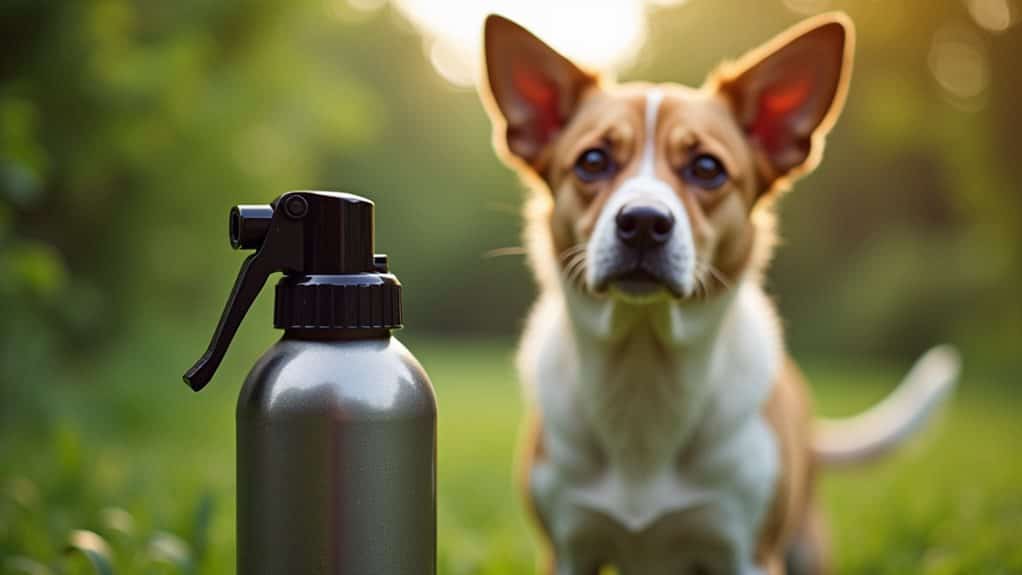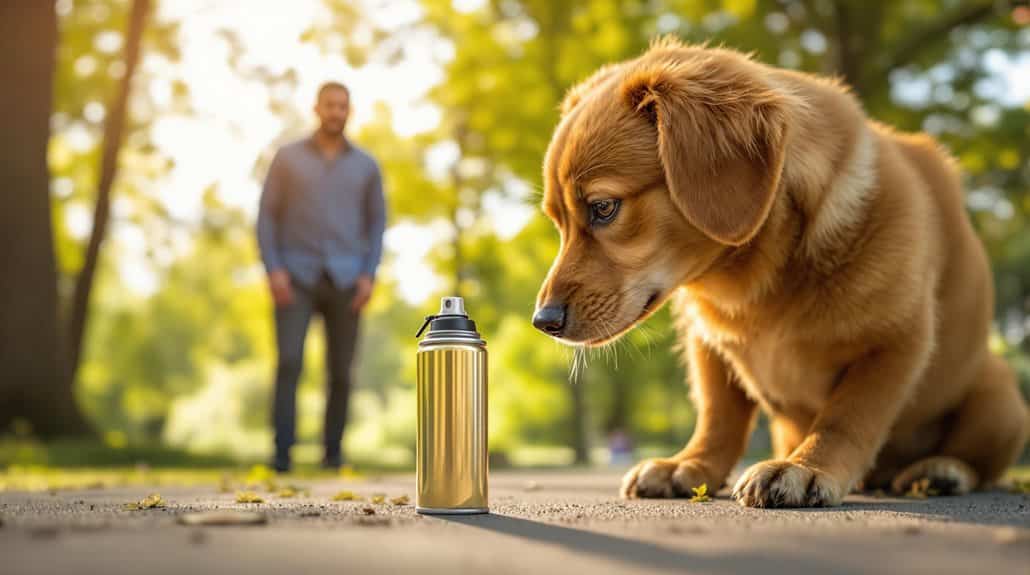Can Pepper Spray Kill a Dog? The Facts
You might be wondering whether pepper spray can actually kill a dog. While it's crafted for self-defense and not intended to be lethal, it can inflict severe discomfort and distress on a dog. The pain, temporary blindness, and respiratory issues it may cause can lead to panic, potentially resulting in dangerous situations. However, understanding the subtleties of its effects and the ethical implications is essential. So, what should you consider before reaching for that canister?
TLDR
- Pepper spray primarily causes temporary discomfort and distress, not lethal harm, to dogs.
- Immediate effects include pain, temporary blindness, and disorientation, but long-term harm is rare.
- Inhalation can lead to breathing difficulties, but serious health risks are uncommon.
- Ethical and legal considerations highlight responsible usage to avoid accusations of cruelty.
- Always prioritize non-lethal alternatives and self-defense strategies to ensure animal safety.
Understanding Pepper Spray

Understanding pepper spray is essential, especially if you're considering its use for self-defense or animal deterrence.
Did you know it's made from capsaicin, the spicy stuff in peppers? Manufacturers mix that with a little alcohol or water, pressurize it, and voilà—instant self-defense! Irritation triggers pain receptors in the eyes, which can lead to immediate discomfort for any target. Inhaling propellant can also pose health risks, so it's crucial to use pepper spray responsibly.
Just remember, varying concentrations mean different effects, so choose wisely.
And hey, don't aim for Fido!
How Pepper Spray Works
How Pepper Spray Works
Pepper spray works by utilizing the power of capsaicin, the active ingredient extracted from chili peppers, to create an intense, temporary irritation. When you spray it, capsaicin binds to receptors in the eyes and throat, causing a burning sensation that can make anyone feel like they just chomped on a super spicy pepper! OC causes immediate dilation of capillaries in the eyes, leading to temporary blindness, which is why it's effective in self-defense situations. It's effective, but it's definitely not a fun experience! Additionally, safety precautions should be taken to avoid accidental exposure to pets, as pepper spray can cause significant distress and discomfort.
Effectiveness Against Dogs

When you're out hiking or running and a dog suddenly decides you look like a tasty snack, pepper spray can be your best buddy!
It's pretty effective at sending aggressive pups packing, but you gotta remember that not all dogs react the same way—factors like breed and coat thickness can throw a wrench in your plan. Additionally, understanding dog behavior can help reduce the likelihood of attacks in the first place. Also, it's important to be aware that ticks exhibit increased activity during rainy weather, which may lead to more encounters with wildlife, including dogs.
Deterrent for Aggressive Behavior
A reliable deterrent for aggressive dogs, pepper spray can effectively incapacitate them in moments of threat. Imagine facing a snarling pup—yikes! Aiming that spray at their face, especially the eyes, can cause temporary blindness and irritation, making them rethink their aggressive behavior. Plus, it works in about 90% of encounters! Just remember, use it responsibly and check your local laws first! Although not all dogs will respond uniformly due to individual tolerance variations, it's essential to remain cautious and assess the situation before use.
Factors Influencing Effectiveness
Understanding the factors that influence the effectiveness of pepper spray against dogs is essential for ensuring safety during encounters. Bigger dogs might need more spray, while those fluffy breeds with thick coats could be less impacted. Plus, a dog's mood and health can change everything! Therefore, it's crucial to use the right formulation designed specifically for dogs to maximize deterrent effects. So, practice aiming for the face, and remember: know your local laws before spraying! Safety first, right?
Safety Considerations
When it comes to using pepper spray on dogs, you've got to keep a few important safety tips in mind! Sure, it can cause temporary discomfort, but you definitely don't want to overdo it or risk any legal trouble—nobody wants to be the person who accidentally breaks the law while trying to defend themselves. Remember that dog spray is primarily effective for animal deterrence, so it's crucial to use it responsibly and be aware of the potential consequences. Additionally, understanding the natural predators that can impact your surroundings may help you choose non-confrontational methods to manage aggressive animal encounters.
Temporary Discomfort Risks
Using pepper spray to deter aggressive dogs can lead to temporary discomfort for the animal, primarily affecting its eyes and skin.
Imagine having a little spicy surprise in your eyes! While it's not permanent, it can cause some serious irritation. However, studies have shown that pepper spray's effectiveness can vary based on environmental factors like wind and distance.
Thankfully, the discomfort fades away, allowing the pup to bounce back.
Just remember, it's meant to keep you safe without causing lasting harm!
Legal Usage Guidelines
Before reaching for pepper spray, it's important to know the legal environment surrounding its use on dogs, as laws can vary considerably by location.
Some places might hit you with fines or even charges of animal cruelty, yikes! Responsible usage is crucial to avoid harmful effects on animals.
Always check local regulations first, and when in doubt, ask local animal control.
Better safe than sorry, right? Keep those furry friends safe!
Ethical Use of Pepper Spray

Responsible use of pepper spray is essential for ensuring both personal safety and the well-being of others, including animals. You've gotta think twice before using it—aim to protect, not harm! Use it only when absolutely necessary, and always follow training guidelines. Remember, pepper spray isn't for training your dog; it's a last resort! Law enforcement has integrated pepper spray into their standard non-lethal weaponry to minimize permanent harm while maintaining safety. Additionally, it's important to consider effective deterrents that can prevent unwanted dog behavior, promoting a safer environment for everyone. Let's keep everyone safe and sound, shall we?
Legal Regulations
When it comes to using pepper spray, you've got to know the local laws, or you might end up in a pickle!
Some places have specific age restrictions, while others might throw a party for misuse consequences, and trust me, it's not the kind of bash you want to attend. Legal consequences may arise from misuse; thus, knowledge of local laws is essential before carrying or using pepper spray.
Local Laws Overview
Understanding the legal environment surrounding pepper spray use on dogs is essential for pet owners and individuals alike. Laws change state to state, so you've got to check your local regulations before you spray! For example, in New York, you can buy it online, but in Massachusetts, you need to go to a licensed dealer. Some states prohibit defense sprays, so it's crucial to stay informed and keep those pups safe!
Age Restrictions
Local laws regarding pepper spray not only cover where and when you can use it but also set specific age restrictions for purchasing and carrying it.
In most states, you need to be 18, but California allows 16-year-olds.
Remember, if you've got a felony or assault conviction, you're out of luck! Additionally, in New York, the minimum age to purchase and use pepper spray is strictly enforced at 18 years old.
Misuse Consequences
Misusing pepper spray can lead to serious legal consequences, including criminal charges and hefty fines.
If you spray it at a dog that's just barking, you might as well be inviting trouble. In some places, you could face charges like assault with a weapon!
Always check local laws, because nobody wants a surprise court date instead of a fun camping trip!
Potential Risks

When considering the potential risks associated with using pepper spray on dogs, it's essential to recognize both health and legal implications.
You might think, "It's just a spray," but inhaling it can mess with their breathing, plus it could even lead to skin irritation. Additionally, exposure can cause immediate discomfort, which may lead to panic and potential secondary injuries.
Legally, misusing it could land you in hot water, so always check your local laws before reaching for that can!
Side Effects on Dogs
Using pepper spray on dogs can lead to a range of distressing side effects that you should be aware of.
It can cause intense pain and temporary blindness, leaving your pup disoriented and confused. Pepper spray can incapacitate dogs for several hours, imagine how you'd feel if someone sprayed you in the face!
While it doesn't usually cause long-term harm, it sure isn't a fun experience for your furry friend.
Best Practices for Use

Proper use of pepper spray is essential for effective defense, especially against aggressive dogs. Aim for the dog's face—eyes and nose are your targets! Use short bursts, not a continuous stream, to keep control. Be aware of wind direction to avoid spraying yourself! Always practice so you're ready when it counts.
Alternatives to Pepper Spray
While pepper spray can be an effective defense tool against aggressive dogs, it's important to contemplate other options that might suit your needs better.
Have you heard of pepper gel? It's great for distance and precision, reducing pesky blowback! Additionally, this compact design makes it easy to carry for personal safety.
Or how about non-irritant dye? It marks attackers without causing harm.
Plus, stun guns and personal alarms are fun to investigate for extra safety!
Overall
So, here's the scoop: pepper spray isn't going to kill a dog, but it can definitely make them really uncomfortable for a bit. Think of it like getting a surprise blast of cold water when you're not ready—yikes, right? But remember, using it should be a last resort! Always be kind and think about other options first. Next time you're out camping or hiking, keep your cool, and enjoy those escapades without any drama! Happy exploring!






